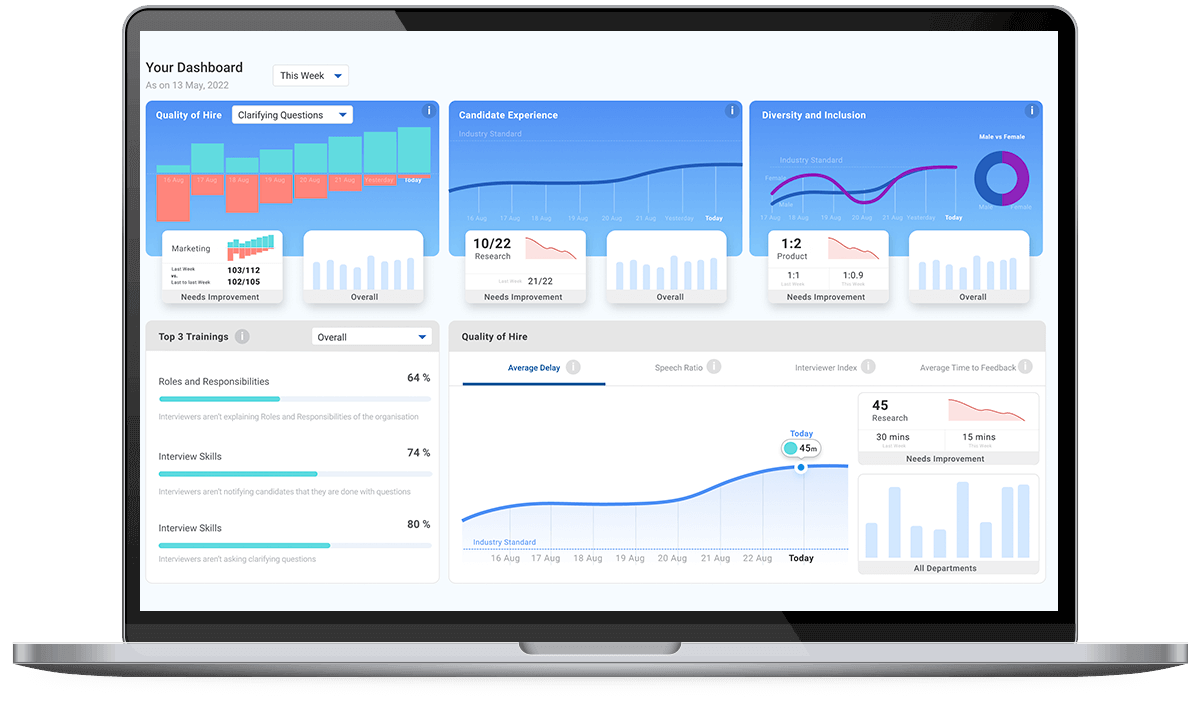As hiring managers, it's our responsibility to ensure that our hiring process is fair, equitable, and inclusive. However, despite our best efforts, unconscious biases can sometimes influence our decision-making. This is why implementing interview bias training is crucial for creating a diverse and inclusive workplace.
In this article, we'll explore 12 benefits of implementing interview bias training for your hiring team, including interview training for hiring managers, interview feedback, interview intelligence, and interview skills training.
Table of Contents:
I. How can understanding unconscious bias impact the hiring process?
Unconscious biases are inherent in all of us, and they can play a role in the hiring process. Hiring managers might hold biases related to a candidate's gender, ethnicity, or other personal characteristics. This can lead to a lack of diversity and inclusion in the workplace, which can harm your company's culture, productivity, and success.
II. Why is interview bias training important for promoting diversity and inclusivity in hiring?
Interview bias training can help your hiring team to recognize and address their unconscious biases. By providing interview training for hiring managers, interview feedback, interview intelligence, and interview skills training, you can create a more equitable and inclusive hiring process.
III. What are effective methods for addressing biases during interviews?
Interview bias can take many forms, such as confirmation bias, where interviewers seek information that confirms their preconceived ideas, or affinity bias, where interviewers are more likely to hire candidates who share their background or interests.
Interview bias training can help your team to recognize and address these biases, creating a more fair and unbiased interview process.
IV. What are the benefits of implementing interview bias training for hiring teams?
Implementing interview bias training can benefit your organization in several ways. Firstly, it can help to attract a more diverse pool of candidates, which can lead to improved creativity, innovation, and problem-solving. It can also help to reduce the risk of legal challenges related to discrimination, improve employee retention, and enhance your company's reputation.
1. Improving Your Interview Process with Interview Bias Training
By providing interview skills training, you can create a structured and consistent interview process that is focused on skills and experience rather than personal characteristics. This can help to reduce the impact of unconscious biases and create a more equitable and inclusive hiring process.
2. Creating a Structured and Consistent Interview Process
Creating a structured and consistent interview process is an essential part of reducing interview bias. By providing interview training for hiring managers, you can ensure that every interviewer is using the same process and evaluating candidates based on the same criteria. This can help to reduce the impact of personal biases and create a more objective evaluation process.
3. Improving Interview Skills Training
Interview skills training can help your team to ask more structured and objective questions. This can help to reduce the impact of personal biases and create a more objective evaluation process. Interview skills training can also help your team to identify and evaluate the skills and experiences that are most important for the role.
4. Enhancing Interview Feedback
Interview feedback is essential for improving the interview process. By providing feedback to the interviewers, you can identify areas where they may be influenced by personal biases and take steps to address these biases. This can, in turn, help in avoiding unconscious biases which hinder organizational policies.
5. Improved job satisfaction and retention
Interview bias training can also improve job satisfaction and retention rates among employees. When employees believe that their workplace values diversity and inclusion, they are more likely to feel valued and respected. This, in turn, can lead to higher job satisfaction and a lower turnover rate.
6. Enhances the company's reputation
When companies actively work to eliminate bias from their hiring practices, it enhances their reputation as a diverse and inclusive employer. This, in turn, can attract more diverse candidates and positively impact the company's overall brand image.
7. Increases Hiring Efficiency
Training your hiring managers on interview skills and eliminating biases can help streamline the recruitment process, reduce time-to-hire and enhance the quality of hire.
With Talview's automated interview tools, you can reduce the amount of time spent on manual tasks such as scheduling interviews, providing feedback, and conducting evaluations. This can free up your hiring team's time and allow them to focus on higher-level tasks such as building relationships with candidates and stakeholders, enhancing the overall recruitment experience.
8. Mitigates potential legal issues
As a recruiter, you must be aware of the legal implications of discrimination during the hiring process. Anti-discrimination laws are in place to ensure equal opportunities for all candidates, regardless of their gender, race, age, religion, or any other protected characteristic.
If your organization is found to have violated these laws, the consequences can be severe, ranging from costly lawsuits to damage to your brand's reputation. By implementing interview bias training for your hiring managers, you can ensure that your recruitment process is fair and unbiased, thus reducing the risk of potential legal issues.
9. Encourages Diversity and Inclusion
Hiring bias can negatively impact diversity and inclusion efforts within the organization. By providing interview training for hiring managers, you can help them identify and eliminate biases in the interview process, resulting in a more diverse and inclusive workforce.
Encouraging diversity and inclusion in the workplace is not just the right thing to do but has been proven to improve business outcomes such as increased innovation, better decision-making, and improved financial performance.
10. Improves candidate experience
Unconscious bias can affect how an interviewer perceives a candidate's responses, body language, or even their appearance. Candidates may pick up on these biases and feel they were unfairly judged, leading to a negative candidate experience.
Providing interview skills training to your hiring managers can help them become more aware of their biases, conduct more objective and fair interviews, and lead to a more positive candidate experience.
11. Improves topic coverage
Interview bias can affect the interviewer's ability to cover all necessary topics during the interview. Interview training for hiring managers can help them become more aware of their biases and provide a structure that ensures all relevant topics are covered during the interview.
This can lead to more objective and comprehensive candidate evaluations.
12. Provide an interview summary
Interview feedback can be overwhelming, particularly if you have conducted multiple interviews. By providing interview intelligence tools for your hiring managers, you can ensure that they provide a comprehensive interview summary that highlights the most important aspects of the interview.
This summary can be shared with the candidate and other stakeholders to facilitate informed decision-making.
How can Talview Interview Insights improve interview feedback and analysis?

A. How does interview bias training streamline the feedback process?
Implementing interview bias training can be challenging, especially if your team is dispersed across different locations or has a busy schedule. With Talview Interview Insights, you can streamline the feedback process by enabling your hiring team to provide feedback in real-time, right after the interview. This allows for more efficient and effective collaboration between interviewers and helps to ensure that feedback is specific and actionable.
B. What role does comprehensive topic coverage play in reducing unconscious bias?
To address unconscious bias, it's important to have a structured and standardized interview process. Talview Interview Insights provides topic coverage analysis, allowing you to assess which topics your team is covering and where there might be gaps in the interview process. This analysis can help you to identify potential areas where bias may creep in and take steps to address them.
C. How does Talview Interview Insights provide interview summaries and analysis?
Talview Interview Insights also provides a summary and analysis of interviews being taken. This can be used to evaluate interview performance, assess consistency across interviewers, and identify areas for improvement. With this information, you can continuously refine your interview process and ensure that you're making the best possible hiring decisions.
D. What AI-powered insights do Talview Interview Insights offer for better hiring decisions?
In addition to providing structured feedback and analysis, Talview Interview Insights uses AI-powered insights to help your team make better hiring decisions. With sentiment analysis, you can identify how a candidate feels about the interview process and whether they're likely to accept a job offer. You can also use natural language processing to identify specific skills and experiences that a candidate possesses, helping you to make more informed hiring decisions.
E: How can utilizing Talview Interview Insights enhance diversity and inclusion efforts in the workplace?
Having skilled hiring teams is a crucial step towards creating a more diverse and inclusive workplace. By utilizing Talview Interview Insights, you can provide your team with the tools and resources they need to make better hiring decisions, reduce bias in the interview process, and attract top talent to your organization.







Leave a Reply